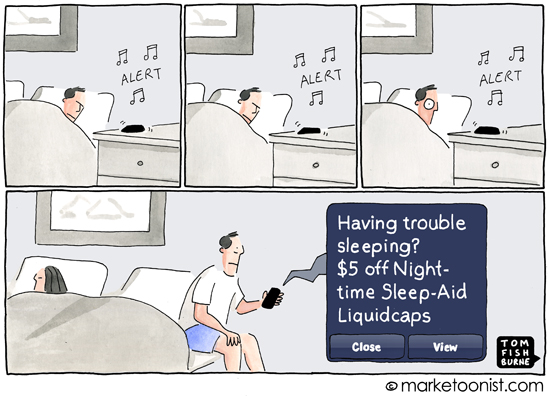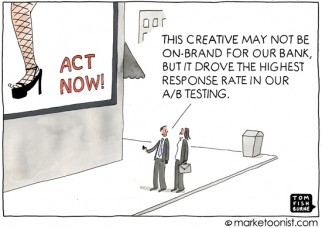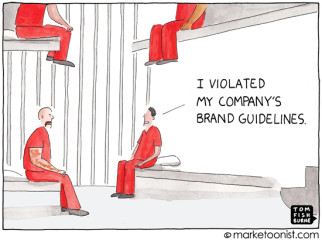There’s a fine line between Push and pushy. Marketers have an extraordinarily powerful tool in reaching consumers through their mobile devices. There is potential to deliver messaging to consumers that is perfectly matched to their intent.
Yet much of the push marketing that I’ve experienced is anything but. Push without relevance is invasive.
There is also a fine line between cool and creepy. As marketers try to dial up the relevance of their offers, they can come across as stalking. A friend of mine received a push notification offering a hotel deal on the same street where he was standing. In one sense, this was highly targeted. Yet in another sense, it seemed a little like Big Brother. Also, the location data wasn’t cross-referenced against his billing address to know that he lives just a short drive away from where the hotel deal was offered. So, it was targeted enough to be creepy, but not targeted enough to be relevant.
We’re in an awkward adolescent stage of mobile marketing. Marketers will continue to experiment with different ways to use this new technology, and will alternately annoy and amaze consumers.
I’d love to hear your stories of mobile marketing, good and bad.
(Marketoonist Monday: I’m giving away a signed print of this week’s cartoon. Just share an insightful comment to this week’s post by 5:00 PST on Monday. Thanks!)



DSprogis says
I feel my cell should be off-limits to marketers. I use it professionally and need to leave it on. I don’t want to be called or buzzed in a meeting, while I am trying to concentrate, or when I am sleeping – unless it is a friend or it is urgent.
I actively protect my number by not using it on forms and I am careful about the apps I download. I have had the same number for over 15 years. Suddenly, I am getting unsolicited phone calls and I am really pissed. Verizon does a lousy job of providing call blocking software – you get 5 numbers that must be renewed after 3 months. You can’t just flag them on your phone, you have to log into Verizon and type them in. Clearly, UX was not a priority. I am not sure what to do next.
The market should offer a protected service, perhaps at a premium, that blocks calls knows to originate from telemarketers. I want it and I am sure I am not alone.
Some things are off-limits and I think the cell phone qualifies.
Jenny says
Mobile marketing can drive me maddest when I can’t get rid of the sender because (a) they offer no means to unsubscribe or (b) I fear that any response at all will only encourage them to deluge my cellphone. Another great flaw, also when it comes to online targeted marketing is that they’re unaware of how long the window of opportunity is. For example, I researched hotels in Berlin in late January; had a wonderful holiday there (thank you airBNB) in early Feb, and most days still get ads popping up to click through for hotel offers – in Berlin! The good news, I guess, is that Big Brother hasn’t kicked in yet as I used my laptop and cellphone in Berlin…..
Tracy Carlson says
Great cartoon and excellent points raised, Tom. One additional thing to keep in mind: bad mobile marketing has consequences for the entire medium. As consumers, we’re more likely to chuck the whole thing and not allow ANY push notifications–and sooner rather than later, if what we get is mostly creepy, irrelevant and/or just boring and self-serving. Why subject yourself to any of it?
Look no further than the fate of TV ads, traditional push marketing. If you have the opportunity to avoid commercials, by fast-forwarding, leaving the room, or whatever, you do it, even though some ads are relevant and entertaining.
tomfishburne says
Hi all,
I just learned there was a technical problem with our Comments engine, so I’m sorry if you had trouble posting Comments the last 24 hours. It is fixed now, but we need to manually sift through a few thousand spam Comments to retrieve them. I should have them up later this week.
Thanks!
-Tom
Jenny says
In Australia it’s called Spam and under the Spam Act 2004 (Cth) a sender can be found to have breached the Act if they send an unsolicited commercial electronic message (UCEM) without the consent of the recipient, without identifying themselves as the sender and without a functional unsubscribe capability. This covers UCEM with an Australian link so that means an Australian sender and recipient, and an overseas sender with an Australian link, that is, the recipient.